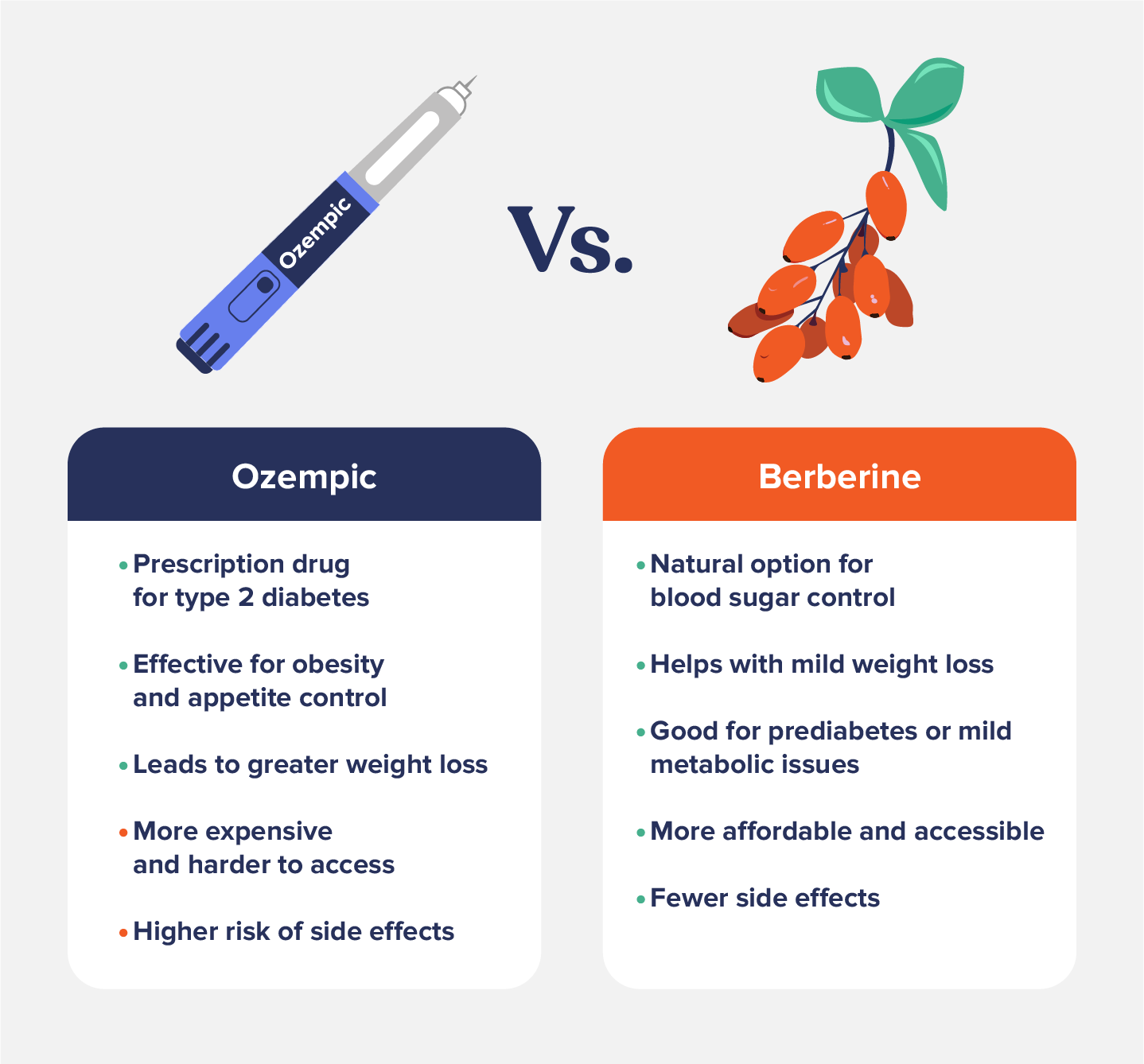Save $40 on your initial consult with a TNI Dietitian!
Talk to a real Dietitian for only $99: Schedule Now
Evidence Based Research To fulfill our commitment to bringing our audience accurate and insightful content, our expert writers and medical reviewers rely on carefully curated research.
Read Our Editorial Policy
If you’re on a weight loss or blood sugar management journey, you’ve likely come across two terms again and again: berberine and Ozempic.
Despite berberine’s nickname as “nature’s Ozempic,” you may wonder if it can really compare to the now-famous prescription drug known for its dramatic weight loss results.
Unfortunately, there’s no quick answer. Both berberine and Ozempic only work sustainably when combined with quality nutrition and exercise, but one may help you more than the other.
Keep reading to find out how berberine and Ozempic stack up, and which might make the most sense for your goals and health status.

Although berberine is dubbed “nature’s Ozempic,” it doesn’t quite work the same as the prescription drug.
Berberine’s primary mechanism of action is activating an enzyme called AMP-activated protein kinase (AMPK), an internal sensor for low ATP (energy) levels inside cells.
When energy levels are low, AMPK helps restore balance by improving insulin sensitivity, reducing glucose production in the liver, and enhancing glucose uptake in muscle cells. These actions can lead to lower blood sugar levels and modest improvements in lipid metabolism.
Conversely, Ozempic (aka semaglutide) is a GLP-1 receptor agonist—a type of medication that mimics the effects of glucagon-like peptide-1, a hormone that plays a key role in appetite and blood sugar regulation.
GLP-1 slows gastric emptying, increases insulin secretion when glucose is present, and reduces glucagon (a hormone that raises blood sugar). These combined effects help lower blood sugar, reduce appetite, and promote significant weight loss.
Overall, berberine’s strength lies in metabolic regulation, especially blood glucose control, while Ozempic provides a more comprehensive therapeutic effect, targeting both glucose and appetite regulation pathways, often leading to more pronounced outcomes.
Get a science-backed calorie & macro plan to lose weight sustainably, built for your life.
Get a science-backed calorie & macro plan to lose weight sustainably, built for your life.

There’s no question that Ozempic is widely recognized for its weight loss benefits.
However, berberine has also been shown to have some weight loss effects, and it has fewer potential side effects, making it an appealing natural alternative for some people.
Because Ozempic mimics GLP-1, it significantly reduces hunger and helps control cravings, making it easier for people to consume fewer calories without feeling deprived.
In clinical studies, people taking Ozempic have lost 12-15% of their body weight on average, with some people experiencing even greater reductions.
On the other hand, berberine supports more gradual weight loss and has been shown to promote fat loss while preserving muscle mass—something Ozempic may not do as effectively.
Berberine works by activating AMPK and reducing the activity of pro-inflammatory molecules. Additionally, it has been shown to reduce the maturation of adipocytes (fat cells) by regulating the genes involved in fat storage and fat cell development.
That said, people who use berberine likely only see a body weight reduction of 3-5%. While encouraging, this is generally not as dramatic or rapid as what’s seen with GLP-1 agonists like Ozempic.
Studies show that berberine significantly reduces body weight, body mass index (BMI), and waist circumference. In a meta-analysis of 12 clinical trials, berberine supplementation moderately but significantly reduced body weight by an average of 4.56 pounds and BMI by 0.47 points.
Overall, both berberine and Ozempic can lead to weight loss, but Ozempic is generally more effective for significant, rapid weight loss due to its direct impact on appetite and food intake.
Berberine, while beneficial for weight management and metabolic health, typically results in more modest weight loss and works more slowly. On the plus side, berberine may cause more fat loss (instead of muscle loss) and is a more natural option for long-term weight management.
Both berberine and Ozempic are known for their ability to manage blood sugar levels, but they work in different ways and can be more or less effective depending on the person.
Berberine has a lot of research behind its glucose-lowering effects, especially in people with type 2 diabetes or insulin resistance. This is again due to its main mechanism of activating AMPK, which improves insulin sensitivity, decreases glucose production in the liver, and increases glucose uptake in muscle cells.
Some smaller studies and meta-analyses have suggested that berberine may be as effective as metformin (a common drug for lowering blood sugar) in certain contexts.
In a meta-analysis of 37 studies, berberine reduced fasting plasma glucose (aka blood sugar) by an average of 0.82 mmol/L (14.77 mg/dL). That’s a clinically meaningful drop, especially for a natural compound. The same analysis also found reductions in HbA1c (a long-term marker of blood sugar) by 0.63 percentage points.
Plus, berberine has the added benefit of reducing inflammatory markers, unhealthy cholesterol levels, and triglycerides, which all play a role in metabolic health.
On the other hand, Ozempic stimulates insulin release when blood sugar is elevated, suppresses glucagon, and slows gastric emptying, which all help to reduce both fasting and postprandial (post-meal) glucose levels.
In clinical trials, Ozempic reduced HbA1c by around 1.0-1.5 percentage points and fasting plasma glucose by approximately 30-40 mg/dL, which is substantially more than berberine.
Overall, berberine is likely better for people looking for milder blood sugar or metabolic issues (like prediabetes, early-stage insulin resistance, or simply long-term metabolic health).
As a prescription drug, Ozempic is a more powerful option for clinical-level blood sugar control, more often for people with more severe metabolic dysregulation or type 2 diabetes.
Berberine is generally considered safe, but it’s not entirely free of side effects—and since the FDA doesn’t regulate dietary supplements for purity or consistency, there’s a higher risk of contamination or inaccurate dosing.
However, several companies have crafted quality berberine supplements.
The most common side effects of berberine are gastrointestinal, including constipation, bloating, or cramping, especially when first starting the supplement.
Berberine may also interact with medications, particularly those metabolized by the liver or those that lower blood sugar, so it should be used with caution. Always ask your doctor before starting berberine if you’re also taking prescription drugs.
Some medications that berberine interacts with include insulin, metformin, statins, calcium channel blockers, anticoagulants, antidepressants, and anti-cancer drugs.
Berberine has been historically used in herbal medicine for centuries, but it doesn’t have as much real-world safety data as Ozempic. Most studies have looked at berberine for 3-6 month periods (sometimes up to a year), but not much longer than that. Therefore, we don’t yet have long-term safety data from prolonged clinical trials on berberine.
Because Ozempic is a prescription drug, it has gone through large-scale, multi-year clinical trials that assess side effects and safety. However, Ozempic is commonly associated with side effects, namely nausea, vomiting, diarrhea, fatigue, and dizziness.
In rare cases, more serious side effects like pancreatitis, gallbladder disease, complications of diabetes-related retina disease (diabetic retinopathy), allergic reactions, and thyroid tumors (in animal studies) have been reported, although the long-term human risk for these outcomes is still being researched.
Overall, for people seeking a natural approach with fewer side effects who aren’t taking other prescription drugs, berberine may be the preferred option. However, for those with more severe blood sugar management needs or who require more significant weight loss, Ozempic may provide a more powerful (albeit more side-effect-prone) solution.
As always, consulting with a healthcare provider is essential before starting any new supplement or medication, especially if you’re managing conditions like diabetes or insulin resistance.
If you choose berberine, make sure you look for a supplement that has been third-party tested for purity, potency, and quality.
Ozempic is significantly more expensive than berberine, though exact costs depend heavily on your insurance coverage. Without insurance, Ozempic typically runs between $1,000 and $1,200 per month. With insurance, copays may drop as low as $25 per month. That said, insurance coverage varies widely, and your cost may be different.
It’s also important to note that Ozempic is more likely to be covered for type 2 diabetes than for weight loss, which can significantly affect out-of-pocket costs.
Conversely, berberine is much more affordable, with most supplements costing between $10 and $40 per month, depending on brand and dosage.
Berberine is also far more accessible—you can buy it over the counter at most supplement retailers or online.
As Ozempic is a prescription drug, it requires a doctor’s approval and may be harder to access depending on insurance requirements or supply.
Due to its popularity in recent years, Ozempic has also faced availability issues in some areas.
There is no one-size-fits-all answer to this question, as it depends on your health history and preferences.
Ozempic is more powerful and well-studied for significant weight loss and glycemic control, but it comes with a higher cost (usually), more side effects, and the need for medical supervision.
Berberine is less potent but a low-cost, lower-risk supplement with promising metabolic benefits—but it’s not as effective for weight loss and has contraindications with certain prescription drugs.
Overall, berberine might be for you if you are looking for a natural option for supporting blood sugar management and mild weight loss or metabolic dysregulation (like prediabetes).
If you have obesity, significant problems with appetite regulation and losing weight, or type 2 diabetes, Ozempic could be a better option. However, Ozempic is much more costly, less accessible, and has a greater potential for side effects.
If you’re considering taking berberine or Ozempic for weight loss or blood sugar management, a Registered Dietitian (RD/RDN) can help you figure out the right path.
While RDs cannot prescribe Ozempic (or any other medications), they can help you make the right nutritional and lifestyle choices to complement the medication if that’s the route you choose.
Whether you’re using berberine or Ozempic, an RD can help tailor dietary recommendations, ensure you’re eating the right amount of food and nutrients for your body, help troubleshoot side effects like nausea or digestive problems, and provide ongoing support to help you stay on track.
Overall, RDs offer the expertise to help you make sustainable, healthy choices to support your treatment plan, ensuring long-term success beyond the medications or supplements themselves.
Book an appointment with our virtual RDs today to start getting the support you need!